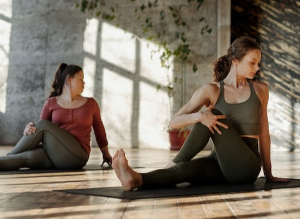Cancer and fitness: How to exercise with The Aunt Sister Project?
Published Aug 9, 2023 • By Polina Kochetkova
Ashley is the founder of The Aunt Sister Project, an association helping people who live with cancer, to become more active and feel more in control when facing the illness. In this interview, Ashley talks about the effects the disease can have on a person and goes into detail about exercise programs available for cancer patients.
Why is it essential to stay active when battling cancer? What activity programs fit cancer patients the best? What benefits can physical activity bring into your life?
Discover in this interview!

Hello Ashley, you have agreed to an interview with Carenity and we thank you for that.
First of all, could you tell us more about yourself?
I am an exercise physiologist, currently living in Brooklyn, New York. My day-to-day life includes running my personal training business, Ash Lentz Training, and my nonprofit, The Aunt Sister Project. In my free time, you’ll find me hanging with my dog, practicing Judo, gardening, and doing any activity that involves nature and the outdoors.
You are a healthcare professional with a focus on fitness for cancer patients. Could you tell us how this job came into your life? When did you start your practice? What was your motivation?
I began studying the benefits of exercise in cancer patients back in 2011, which was coincidentally the same time that my aunt, Sister Helene Lentz, was diagnosed with Stage IV ovarian cancer. As I studied for my first-ever cancer certification, I saw my aunt go through treatment and surgery. It was as though she was experiencing first-hand all the cancer-related situations I was reading about in my courses. She died not long after her diagnosis, and right before I achieved my first certification. Shortly thereafter I began working with my first group of survivors, and my life changed forever. I had never worked with a more determined and inspiring group of individuals. I knew then that I wanted to devote my life to helping this part of the population, and that I would do it to honor the memory of my aunt. It was my ultimate dream to start a nonprofit that provided exercise exclusively to cancer survivors.
Why do you believe in the importance of physical exercise for cancer patients? What benefits does it present for those struggling with the illness?
Until roughly 20 years ago, many cancer diagnoses and treatment plans were accompanied by a doctor’s prescription for rest and time to allow for healing and recovery. Relatively recently physicians began suggesting exercise programs for those undergoing treatment, but ASP does not currently see the needed emphasis and attention placed on the importance of physical activity. We strongly believe that all cancer warriors should be directly referred to a cancer exercise specialist, just as they would be a physical therapist.
Cancer can rob patients of a sense of agency, power, and control of their bodies and their lives. Specialized exercise programs empower survivors to engage in healthy physical activity on their own terms, fundamentally changing the experience of treatment, recovery, and long-term wellness. Research supports that physical activity -- at any level -- contributes to improved mental and physical strength and endurance before, during, and after treatment. Prescriptions to “try to work out” “get more exercise” or “do what you can” are insufficient: patients, who may be experiencing fatigue and depression, often find this suggestion to be imprecise, insensitive, or impractical. Specialized group programs enable survivors to integrate physical activity into their lives, regardless of the stage of treatment, in an accessible, stress-free, supportive virtual community.
You are the founder of an organization called The Aunt Sister Project. Tell us about it? What is the purpose of the organization? Why did you decide to create this association?
The Aunt Sister Project is a nonprofit organization that provides health and wellness programs exclusively to cancer survivors, in any phase of the cancer journey. Our programs are 100% online and accessible to anyone via a smart device. We charge minimal fees while some participate free of charge. All classes are led in real-time by a certified cancer exercise specialist, and each program is tailored to the individual’s needs and abilities. Anyone who has ever had a cancer diagnosis (over the age of 18 with medical clearance) is eligible to participate.
I started this organization in 2020 during the height of the Covid-19 pandemic. I saw a need for cancer survivors to stay active and build connections while avoiding the risks associated with working out in a public facility.
What I found was that most people going through treatment, for many reasons actually prefer remote workouts. I decided to keep all programs 100% virtual, and from there began to grow our participant base and enhance the curriculum.
What are The Aunt Sister Project’s main missions?
ASP’s primary purpose is to increase the quality of life of the individual. First by improving elements of physical fitness: strength, endurance, range of movement, and balance. Second, by decreasing the occurrence of acute and chronic physical side effects associated with cancer and treatment: pain, nausea, fatigue, lymphedema, neuropathy, and dizziness. Third, by decreasing the occurrence of acute and chronic mental side effects associated with cancer and treatment: depression, anxiety, negative body image, fear of recurrence, and low self-confidence. Lastly, by facilitating connections and relationships so that participants know they are not alone in their fight.
What are The Aunt Sister Project’s actions? What courses do you offer? How does a session unfold?
The Aunt Sister Project aims to inspire, empower, and educate every survivor in our programs. Our three-phase strategy includes an 8 week progressive group training regimen where participants will learn, improve, and reinforce the foundations of movement and exercise in relation to their current needs and abilities (Phase 1), then progress to more complex and higher intensity routines, at which time adherence is reinforced, and participants can learn to be self-sufficient in their ongoing exercise routines (Phase 2). Upon completion of the 8-week program, all participants are highly encouraged to continue through the maintenance phase by attending ongoing graduate classes to support their long-term wellness as well as stay connected to ASP’s mission and fellow participants (Phase 3).
What is your geographical scope of action?
We currently serve cancer survivors in all time zones across the United States, but we hope to expand our reach overseas in the coming months.
What have been the most rewarding aspects of your work?
The most rewarding and surprising aspect is the relationships and comradery established among the participants. We have survivors who have built and maintained very close friendships despite living in different time zones and having never met in real life. Our groups are truly supportive of one another – it’s like a support group without being a support group!
What is your goal? What are your plans for the future?
We hope to continue growing and reaching even more survivors in rural and underserved communities, across the U.S. and eventually across the globe!
Finally, what advice would you like to give to Carenity members who are affected by cancer?
Some days, exercise may be the last thing you want to do. But I promise, even standing up and sitting down ten times will immediately improve your mood and energy. And if you have a group of friends who are there on the journey with you, it makes it that much easier to show up!
You can discover more on the Aunt Sister Project website or Instagram!
A big thank you to Ashley for this interview!
Did you find this story helpful?
Click Like and share your thoughts and questions with the community in the comments below!
Take care of yourself!

 Facebook
Facebook Twitter
Twitter


